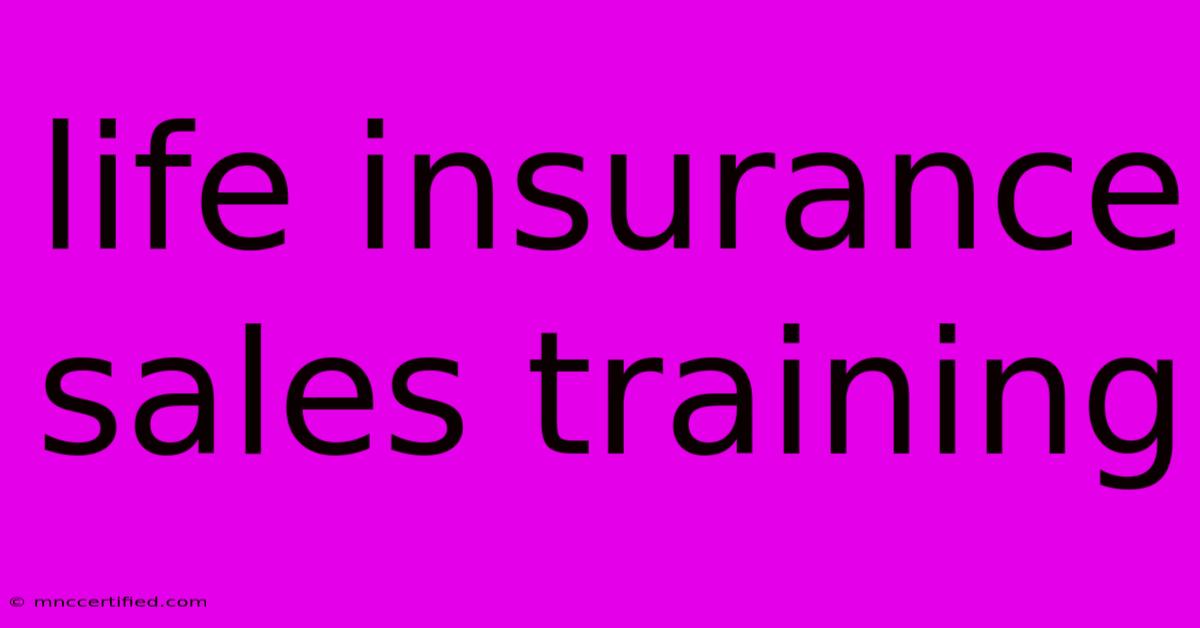Life Insurance Sales Training

Table of Contents
Life Insurance Sales Training: Mastering the Art of Protecting Futures
Selling life insurance isn't just about selling a product; it's about selling peace of mind and financial security. This requires more than just product knowledge; it demands exceptional sales skills, empathy, and a deep understanding of your client's needs. Effective life insurance sales training is the cornerstone of success in this rewarding yet challenging field. This comprehensive guide delves into the essential elements of a top-tier training program, covering everything from prospecting and needs analysis to closing the deal and building long-term client relationships.
Essential Components of a Robust Life Insurance Sales Training Program
A truly effective training program should be multifaceted, addressing both the hard skills and the soft skills necessary for success. Here are some key components:
1. Product Knowledge: Knowing Your Insurance Inside and Out
Before you can sell life insurance effectively, you need to understand it thoroughly. This includes:
- Different types of life insurance: Term life, whole life, universal life, variable life, etc. Knowing the nuances of each policy is crucial for recommending the right fit for each client.
- Policy features and riders: Understanding additional benefits like accidental death benefits, disability waivers, and long-term care riders empowers you to tailor policies to individual needs and circumstances.
- Insurance regulations and compliance: Staying up-to-date on legal and regulatory requirements is paramount to maintaining ethical and compliant sales practices.
2. Sales Techniques & Strategies: The Art of Persuasion
Effective life insurance sales rely heavily on strong sales techniques. Your training should cover:
- Needs analysis: Learning to effectively identify and assess a client's financial needs and goals is critical. This involves active listening, asking insightful questions, and uncovering underlying concerns.
- Prospecting and lead generation: Mastering techniques for finding qualified leads, whether through networking, referrals, or online marketing, is essential for a steady stream of potential clients.
- Overcoming objections: Handling objections gracefully and professionally is a crucial skill. Training should equip you with strategies to address common concerns and build trust.
- Closing the sale: Learning various closing techniques, while ensuring ethical and transparent practices, is vital for converting prospects into clients.
- Presentation skills: Effective communication is key. Training should focus on delivering clear, concise, and persuasive presentations that resonate with potential clients.
3. Building Rapport and Trust: The Human Element
While product knowledge and sales skills are crucial, building strong relationships is the cornerstone of long-term success in life insurance sales. Your training should emphasize:
- Active listening: Truly hearing and understanding your client's concerns and aspirations builds trust and rapport.
- Empathy and understanding: Connecting with clients on an emotional level allows you to understand their needs beyond the financial aspects.
- Ethical sales practices: Maintaining integrity and transparency is crucial for building lasting relationships and a strong reputation.
4. Continuing Education & Professional Development: Staying Ahead of the Curve
The life insurance industry is constantly evolving. Continuous learning is essential for staying current on new products, regulations, and best practices. A robust training program should incorporate opportunities for:
- Regular updates and refresher courses: Keeping your knowledge sharp is crucial for maintaining your competitive edge.
- Industry conferences and events: Networking and learning from industry experts can significantly enhance your skills and knowledge.
- Mentorship and coaching: Learning from experienced professionals provides invaluable guidance and support.
Finding the Right Life Insurance Sales Training Program
Choosing the right training program is crucial for your success. Look for programs that offer:
- Experienced instructors: Learn from those who have a proven track record in the industry.
- Comprehensive curriculum: Ensure the program covers all the essential components outlined above.
- Practical, hands-on training: Gain practical experience through role-playing, simulations, and real-world scenarios.
- Ongoing support and mentorship: Access to ongoing support and guidance after completing the program is invaluable.
In conclusion, successful life insurance sales require a combination of technical knowledge, strong sales skills, and a genuine commitment to serving your clients. Investing in high-quality life insurance sales training is an investment in your future success. By mastering these essential components, you'll be well-equipped to build a thriving and rewarding career in this essential industry.

Thank you for visiting our website wich cover about Life Insurance Sales Training. We hope the information provided has been useful to you. Feel free to contact us if you have any questions or need further assistance. See you next time and dont miss to bookmark.
Featured Posts
-
Brett Crypto Price Prediction
Nov 28, 2024
-
Misdemeanor While Out On Bond
Nov 28, 2024
-
Is Biote Covered By Insurance
Nov 28, 2024
-
Euro Millions Check Tickets Blunder
Nov 28, 2024
-
Liverpool Vs Real Madrid Key Moments Live
Nov 28, 2024